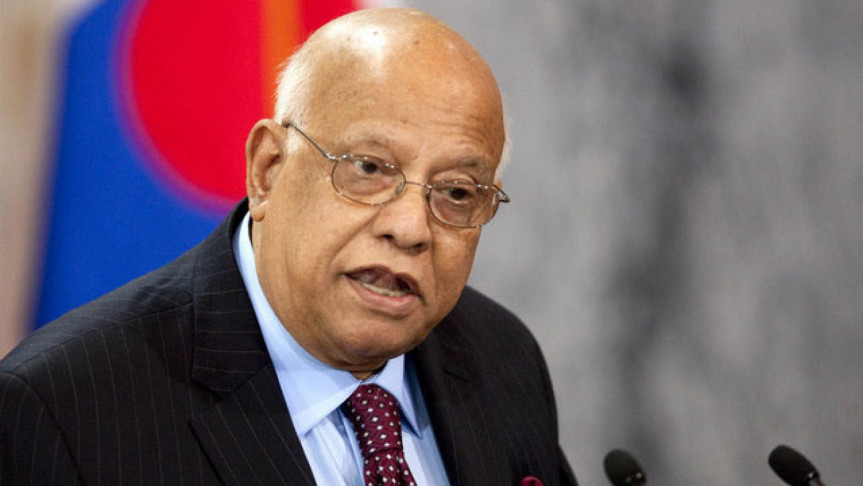Muhith spells out 6 key economic challenges lying ahead

Dhaka: Finance Minister AMA Muhith on Sunday highlighted six major macroeconomic challenges, including the one to overcome the downtrend in remittance inflow and restoring discipline and balance in the financial sector.
"We'll have to deal with prudence six major macroeconomic challenges in the coming days," Muhith said while placing the report on budget implementation progress of first quarter (July-September), the trend of income and expenditure, and macroeconomic analysis in Parliament.
Terming the current trend of remittance the first challenge, Muhith said Bangladeshi workers engaged in some countries now even started to work in low wages so that they need not to return to Bangladesh. "Hopefully, we'll be able to overcome this situation soon."
About the 2nd challenge – the use of savings certificates as a tool of financing, he said currently the rate of interest against the savings certificates is high and the government will try to adjust its interest rate.
Regarding the 3rd challenge to ensure full implementation of ADP, the Finance Minister said the Planning Ministry and the other implementing ministries and divisions have already been cautioned in this regard. "The Planning Minister himself is taking special initiatives to this end."
He said there is a lack of high and mid-level skilled manpower in the country's industrial management whereby the government has been establishing various training institutes and putting special emphasis on skill development.
Terming restoration of discipline and balance in the financial sector the 5th challenge, the minister said this vital issue has under been special attention of the government in every moment.
The last and the 6th challenge is to keep due attention to various reform initiatives in the infrastructure and good governance for the sake of the country's economic development saying.
Mentioning that the current private sector investment ratio to GDP is 23 percent, Muhith said it would rise to 26.6 percent by the end of 7th Five-year Plan. "We've been able to do what could be done in the public sector."
He said the final destination of the government is to turn Bangladesh into a knowledge-based mid-income country by 2021 and thus transform it into a prosperous developed one by 2041 through poverty alleviation and ensuring overall development of people’s living standards.
"To attain this goal, we'll have to gain higher growth, and it’s a matter of optimism that the basic macroeconomic indicators like GDP growth, inflation, import and export growth, foreign currency reserve and exchange rate are satisfactory," he added.
Highlighting the increasingly deepening economic relations of Bangladesh with the different countries, Muhith said the visit of Chinese President Xi Jinping to Bangladesh in last October would remain as a milestone in the history of the country through signing of one grant agreement, two framework agreements, three Memorandum of Understandings (MoUs), and four credit agreements.
"Through these agreements, Bangladesh will get foreign assistance around $20 billion against 27 projects through which the FDI in the country will get a boost alongside enhancing production capability," he added.
The Finance Minister said Bangladesh in its recent history of the country has attained highest 7.11 percent GDP growth in the last fiscal year while the target for GDP growth in the current fiscal year is 7.2 percent.
Highlighting some key macroeconomic indicators during the first quarter (July-September) of the current fiscal year, he said the revenue collection under the NBR rose by 17.94 percent, the overall public expenditure increased by 15.49 percent, the ADP implementation rose to Tk 9,767 crore, export earnings totaled $8079 million, import expenditure increased by 17.27 percent to $ 11.11 billion, the growth for opening import LCs and settlement is 10.16 percent and 16.97 percent respectively, the private sector credit flow increased by 15.34 percent, while the rate of general point to point inflation came down at 5.5 percent in last September.
About the overall revenue collection scenario during the first quarter, Muhith said about Tk 43,597 crore were collected during the first quarter which was about 17.96 percent of the budgetary target. "Some one-fifth of the revenue collection target was achieved during the first quarter and we need to increase our activity to collect revenue and thus meet the target. We're working to this end."
He said the target for the revenue collection in the current fiscal year was earlier set at Tk 242,752 crore.
About the government expenditure situation during the first quarter, he said compared to the first quarter of the last fiscal year, the overall government expenditure during the first quarter increased by 15.49 percent, the non-development expenditure increased by 19.35 percent while the ADP implementation by 0.42 percent.
Commenting on the budget deficit, the Finance Minister said the budget deficit in the last fiscal year was 3.46 percent while the target of budget deficit in the current fiscal year has been fixed at Tk 97,853 crore which is also five percent of the GDP.
Regarding the interest rate, he said it was his belief that the downtrend of the interest rate will help boost investment while the treasury bill and bond, alongside the interest rate on Bangladesh Bank bill, has come down to a significant rate.
The satisfactory agricultural production, steady price of fuel oil in international market, favourable monetary supply situation, and overall stable political environment will help keep the countrywide supply chain stable for which the inflation rate will not increase in the coming days, hoped the Finance Minister.
In his statement, Muhith also touched upon various aspects of education, health, power and energy, communication infrastructure, agriculture and rural development, social welfare, expatriates welfare and industrial sector.





